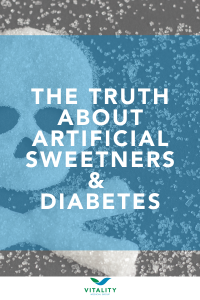
But don’t get too excited because artificial sweeteners aren’t healthy. While too much sugar is almost certainly linked to insulin resistance and diabetes, recent research suggests that consuming excessive quantities of sweeteners may also contribute to the development of insulin resistance. Insulin resistance, sometimes known as pre-diabetes, can lead to heart attacks, strokes, high cholesterol, and eye problems.
What is Insulin Resistance?
Certain levels of sugar in our blood are necessary for our body to function. Almost all the cells of our body burn glucose as fuel. As a result, our bodies have evolved to store glucose in case we need it later. Excessive amounts of sugar in our bloodstream are toxic. So the hormone insulin, which is one of the first known hormones, evolved to help us store insulin in our muscle cells and liver. The problem is we can only hold so much glucose inside the cells.
When we eat sweets, our bodies create massive amounts of insulin, which is required to break down sugar from the bloodstream. Our cells have insulin receptors that ensure they get the right amount of sugars they need to function correctly. But as the cells start to fill up, the receptors shut down to stop the flow of glucose into storage. Unfortunately, repeated insulin spikes- primarily precipitated by consuming large amounts of sugar- cause our insulin receptors to get worn out and stop working properly with an overabundance of sugar in our blood, which causes a whole host of problems in the body.
Training the Brain
“Food is not just calories. It’s information,” says Functional Medicine expert Dr. Mark Hyman. This information makes artificial sweeteners so dangerous. While artificial or non-nutritive, sweeteners seem like the perfect solution to growing concerns about the rates of obesity in the first world; they actually train the brain to crave more sweets and thus can be more addictive than real sugar.
Also, because non-nutritive sweeteners do not register in the body as sugar, they don’t trigger the feeling of fullness or satisfaction, yet at the same time train the taste buds to require more and more sweetness. As a result, folks eat and drink too much and crave increased sweetness in the foods they eat, which can cause blood sugar fluctuations.
Another potentially more serious issue with aspartame is that it turns into methanol, aka wood alcohol, when broken down in your gut. (Think paint thinner, antifreeze, and windshield wiper fluid- would you ever think to drink these?) To your gut, these are highly toxic. In addition, as your body breaks down methanol, it turns it into formaldehyde. Formaldehyde is also extremely toxic and can cause long-term damage to your liver, gut, and other tissues.
Destroying the Gut Biome
Is it true that sweeteners harm our gut bacteria? It's possible. Studies show that when mice eat large amounts of artificial sweeteners like aspartame, saccharin, and sucralose, their gut flora changes dramatically: harmful bacteria increase, and good bacteria decrease. When these gut bacteria changes occur, the mice begin to exhibit signs of insulin resistance.
Furthermore, recent studies have shown that many artificial sweeteners might transform helpful bacteria in the gut microbiota into harmful germs and induce severe health conditions such as blood poisoning and sepsis.
According to a new study from Newcastle University, sugar substitutes like aspartame, saccharin, and sucralose can cause helpful gut bacteria such as E. coli and E. faecalis to become pathogenic. Then they can cross the gut wall and destroy the cells lining the intestinal tract that protect the bloodstream from potentially harmful bacteria.
What's the alternative?
Ultimately, excessive processed sugars- whether they be white sugar or artificial sweeteners- can harm your health.
While it's true that consuming sugar is unnecessary and unhealthy, the fact is that people tend to consume sugar anyway. If you haven’t been able to kick the sugar habit and you feel you need sugar, there are many natural sweeteners and aromas that you may use to enhance meals without the need for processed sugars. Raw honey, monk fruit, vanilla, and cinnamon are all wonderful options. Stick to whole, unprocessed foods and discover the potential of naturally flavored food to retrain your taste buds to appreciate natural sweetness in small quantities.




Recent Comments